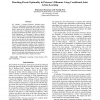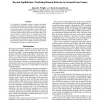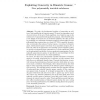CORR
2010
Springer
15 years 1 months ago
2010
Springer
It is frequently suggested that predictions made by game theory could be improved by considering computational restrictions when modeling agents. Under the supposition that player...
102
click to vote
AAMAS
2007
Springer
15 years 1 months ago
2007
Springer
We consider a repeated Prisoner’s Dilemma game where two independent learning agents play against each other. We assume that the players can observe each others’ action but ar...
AAAI
2010
15 years 1 months ago
2010
It is standard in multiagent settings to assume that agents will adopt Nash equilibrium strategies. However, studies in experimental economics demonstrate that Nash equilibrium is...
101
click to vote
UAI
2000
15 years 2 months ago
2000
Multi-agent games are becoming an increasingly prevalent formalism for the study of electronic commerceand auctions. The speed at which transactions can take place and the growing...
101
click to vote
AAAI
2006
15 years 2 months ago
2006
Significant work has been done on computational aspects of solving games under various solution concepts, such as Nash equilibrium, subgame perfect Nash equilibrium, correlated eq...
NIPS
2007
15 years 2 months ago
2007
Extensive games are a powerful model of multiagent decision-making scenarios with incomplete information. Finding a Nash equilibrium for very large instances of these games has re...
101
click to vote
IJCAI
2007
15 years 2 months ago
2007
This paper is a comparative study of game-theoretic solution concepts in strictly competitive multiagent scenarios, as commonly encountered in the context of parlor games, competi...
115
Voted
AAAI
2010
15 years 2 months ago
2010
We consider risk-sensitive generalizations of Nash and correlated equilibria in noncooperative games. We prove that, except for a class of degenerate games, unless a two-player ga...
118
click to vote
APPROX
2010
Springer
15 years 2 months ago
2010
Springer
Abstract. We study the fundamental problem of computing an arbitrary Nash equilibrium in bimatrix games. We start by proposing a novel characterization of the set of Nash equilibri...
115
Voted
ESA
2008
Springer
15 years 2 months ago
2008
Springer
Following recent interest in the study of computer science problems in a game theoretic setting, we consider the well known bin packing problem where the items are controlled by se...



